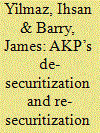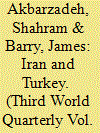| Srl | Item |
| 1 |
ID:
171944


|
|
|
|
|
| Summary/Abstract |
This article evaluates the Turkish state’s relations with the Alevi community through a securitization theory framework. It first examines the issue in its historical context, comparing Kemalist and more recent policies, and highlights that despite the ideological differences between the previous governments and the current AKP government, for Alevis much has remained the same. It then turns to the securitization of the Alevis by successive regimes, and demonstrates that the period of de-securitization begun under the AKP did not end the practice, and that political expedience led to the issue’s re-securitization.
|
|
|
|
|
|
|
|
|
|
|
|
|
|
|
|
| 2 |
ID:
152087


|
|
|
|
|
| Summary/Abstract |
The rise and subsequent erosion of friendly relations between Iran and Turkey was a result of their regional ambitions. While Turkey had long seen its secular system as presenting an alternative to Iran’s Islamic ideology, the alignment of their regional interests facilitated a rapport between the two states in the first decade of the twenty-first century. However, the Arab Spring proved divisive for this relationship as each state sought to advocate its model of government and secure a leadership role in the Arab world. The war in Syria widened the divide, as Iran’s long-standing support for the Bashar al-Assad regime could not be reconciled with Turkey’s desire to see President Assad out of office. Using a close reading of Persian and Turkish sources, the authors will analyse the Iran–Turkey divide, focusing specifically on how the Iranians have portrayed it as a clash of civilisations, citing Turkey’s so-called ‘neo-Ottoman’ ambitions as the primary cause.
|
|
|
|
|
|
|
|
|
|
|
|
|
|
|
|
| 3 |
ID:
154102


|
|
|
|
|
| Summary/Abstract |
This paper incorporates a study of “re-ghettoization” among the Armenian Christians of the Islamic Republic of Iran. It focuses on how legal marginalization has led to the emergence of an entirely separate existence from the Muslim majority in Tehran among Armenians born after the revolution. By focusing on the spatial and social divisions of the hayashatner (Armenian neighborhoods) and the “social” ghetto of the Ararat Compound, this article addresses the question: what are the social implications for religious discrimination in the Muslim Middle East? This paper is based on three extensive blocks of fieldwork carried out in Iran from 2010 to 2015.
|
|
|
|
|
|
|
|
|
|
|
|
|
|
|
|